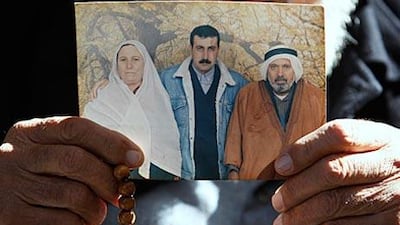Following the murder of Hamas leader Mahmoud al Mabhouh in a UAE hotel two weeks ago, The National's foreign desk looks at how the Gaza Strip's neighbour has often used novel methods to get rid of its enemies, trumping foreign policy considerations. We may never know exactly who was behind the murder of Mahmoud al Mabhouh, the senior Hamas operative who was killed in a Deira hotel late last month.
Reports said he was electrocuted with a Taser gun, then asphyxiated. The killing could well have stemmed from an internecine struggle for which militant groups and underground movements in general, and the Palestinians in particular, are legendary. Still, precedent points to Israel, which has used all sorts of novel ways in other attempts to deal quietly with its foes. More significantly, since its establishment in 1948, it has assumed the right to eliminate its enemies wherever they can be found. It has no death penalty and has executed only one man after a court trial - the Nazi Adolph Eichmann. It has often opted for the shadows instead.
So if indeed Israel's spy agency, Mossad, did orchestrate the killing of al Mabhouh, as Hamas alleges, it is a reminder again of how Israel's keenness for dealing covertly with its adversaries often trumps other foreign policy considerations. Unlike the car-bomb killing two years ago of Imad Mughniyeh, a Hizbollah operative, in Syria, this assassination did not take place on what Israel - at least officially - regards as enemy soil. It took place in the UAE.
In recent years, Israel has spoken frequently of the importance of the UAE and other Gulf governments to the Arab-Israeli peace process. Israelis quietly do business in the Gulf, and the opening of small-scale embassies or "interest sections" in Gulf capitals is widely seen as a key first step towards an eventual resolution of the Israeli-Palestinian conflict. If it violated UAE sovereignty to carry out the killing of al Mabhouh, who was alleged to have overseen arms transfers from Iran to the Gaza Strip, the government of Benjamin Netanyahu was apparently willing to risk embarrassing Abu Dhabi and put its delicate relations with the government in jeopardy. It also signalled its disregard for the peace process, and the role of a significant player in it.
If so, it was a political calculus reminiscent of one at work in 1997 when Mr Netanyahu, during his previous tenure as Israel's prime minister, approved an assassination attempt on Khalid Meshaal, the exiled Hamas leader, while in Jordan. Against widespread opposition across the Arab world, Jordan's King Hussein had signed a peace treaty with Israel three years earlier. Even so, Mr Netanyahu approved the assassination scheme, which called for two Mossad agents disguised as Canadian tourists to spray levofentanyl, a lethal nerve toxin, in Mr Meshaal's ear as he walked into his Amman office. Forty-eight hours later, the drug would kill him, leaving no trace.
Despite Hamas's proposal three days earlier for a 30-year hudna or truce, the Mossad agents succeeded on September 25, 1997, in squirting the poison into Mr Meshaal's ear. They were chased, however, by an alert bodyguard. The Hamas leader was saved by an outraged King Hussein, who phoned Bill Clinton, the US president, and demanded that Israel provide an antidote. An embarrassed Mr Netanyahu did.
The fallout from al Mabhouh's murder is unlikely to echo this script. We live in an era less prone to red faces. In the post-9/11 world, rules have changed for dealing with those accused of carrying out acts of terrorism. More gloves are off, and Israel is hardly alone. The United States has carried out targeted assassinations in Yemen, and they are a regular occurrence on the Afghan-Pakistani frontier.
foreign.desk@thenational.ae

